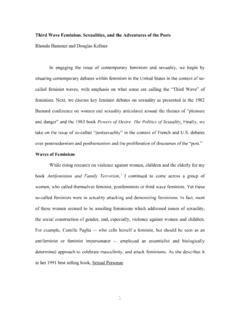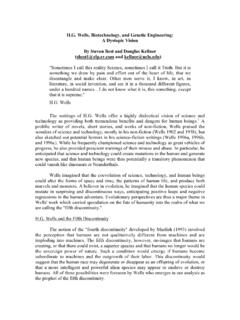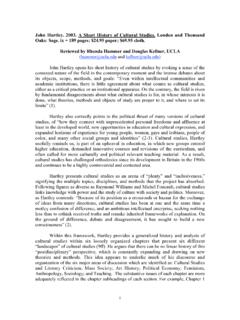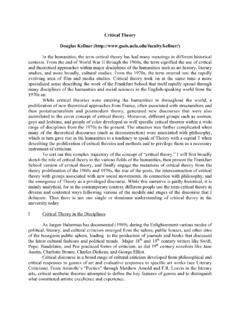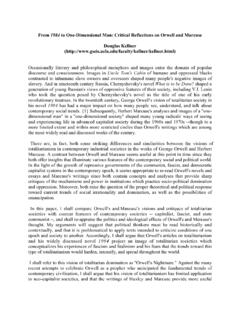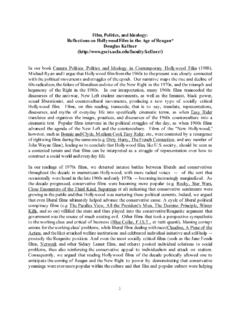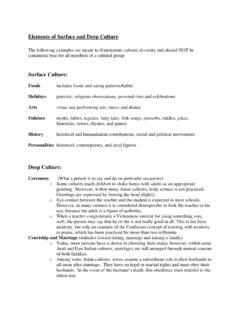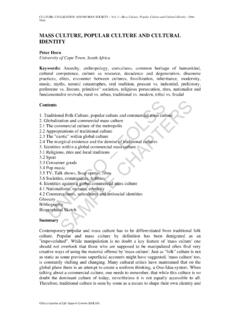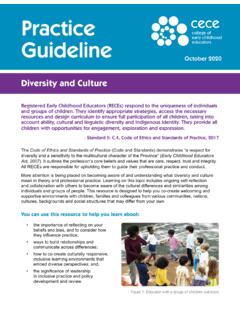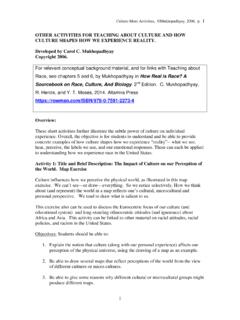Transcription of Cultural Studies, Multiculturalism, and Media Culture ...
1 1 Cultural Studies, Multiculturalism, and Media CultureDouglas Kellner( )Radio, television, film, and the other products of Media Culture provide materials out ofwhich we forge our very identities; our sense of selfhood; our notion of what it means to be maleor female; our sense of class, of ethnicity and race, of nationality, of sexuality; and of "us" and"them." Media images help shape our view of the world and our deepest values: what weconsider good or bad, positive or negative, moral or evil. Media stories provide the symbols,myths, and resources through which we constitute a common Culture and through theappropriation of which we insert ourselves into this Culture . Media spectacles demonstrate whohas power and who is powerless, who is allowed to exercise force and violence, and who is dramatize and legitimate the power of the forces that be and show the powerless that theymust stay in their places or be are immersed from cradle to grave in a Media and consumer society and thus it isimportant to learn how to understand, interpret, and criticize its meanings and messages.
2 Themedia are a profound and often misperceived source of Cultural pedagogy: They contribute toeducating us how to behave and what to think, feel, believe, fear, and desire -- and what not Media are forms of pedagogy which teach us how to be men and women. They show us howto dress, look and consume; how to react to members of different social groups; how to bepopular and successful and how to avoid failure; and how to conform to the dominant system ofnorms, values, practices, and institutions. Consequently, the gaining of critical Media literacy isan important resource for individuals and citizens in learning how to cope with a seductivecultural environment. Learning how to read, criticize, and resist socio- Cultural manipulation canhelp empower oneself in relation to dominant forms of Media and Culture .
3 It can enhanceindividual sovereignty vis-a-vis Media Culture and give people more power over their this essay, I will discuss the potential contributions of a Cultural studies perspective tomedia critique and literacy. In recent years, Cultural studies has emerged as a set of approaches tothe study of Culture and society. The project was inaugurated by the University of BirminghamCentre for Contemporary Cultural Studies which developed a variety of critical methods for theanalysis, interpretation, and criticism of Cultural Through a set of internal debates, andresponding to social struggles and movements of the 1960s and the 1970s, the Birmingham groupcame to focus on the interplay of representations and ideologies of class, gender, race, ethnicity,and nationality in Cultural texts, including Media Culture .
4 They were among the first to study theeffects of newspapers, radio, television, film, and other popular Cultural forms on also focused on how various audiences interpreted and used Media Culture differently,analyzing the factors that made different audiences respond in contrasting ways to various studies of youth subcultures, British Cultural studies demonstrated how culturecame to constitute distinct forms of identity and group membership. For Cultural studies, mediaculture provides the materials for constructing views of the world, behavior, and even who uncritically follow the dictates of Media Culture tend to "mainstream" themselves,conforming to the dominant fashion, values, and behavior. Yet Cultural studies is also interested inhow subcultural groups and individuals resist dominant forms of Culture and identity, creatingtheir own style and identities.
5 Those who obey ruling dress and fashion codes, behavior, andpolitical ideologies thus produce their identities within mainstream group, as members of specificsocial groupings (such as white, middle-class conservative Americans). Persons who identifywith subcultures, like punk Culture , or black nationalist subcultures, look and act differently fromthose in the mainstream, and thus create oppositional identities, defining themselves againststandard models. Cultural studies insists that Culture must be studied within the social relations andsystem through which Culture is produced and consumed, and that thus study of Culture isintimately bound up with the study of society, politics, and economics. Cultural studies showshow Media Culture articulates the dominant values, political ideologies, and social developmentsand novelties of the era.
6 It conceives of Culture and society as a contested terrain withvarious groups and ideologies struggling for dominance (Kellner 1995). Television, film, music,and other popular Cultural forms are thus often liberal or conservative, or occasionally expressmore radical or oppositional studies is valuable because it provides some tools that enable one to read andinterpret one's Culture critically. It also subverts distinctions between "high" and "low" Culture byconsidering a wide continuum of Cultural artifacts ranging from novels to television and byrefusing to erect any specific Cultural hierarchies or canons. Previous approaches to culturetended to be primarily literary and elitist, dismissing Media Culture as banal, trashy, and notworthy of serious attention.
7 The project of Cultural studies, by contrast, avoids cutting the fieldof Culture into high and low, or popular against elite. Such distinctions are difficult to maintainand generally serve as a front for normative aesthetic valuations and, often, a political program( either dismissing mass Culture for high Culture , or celebrating what is deemed "popular" whilescorning "elitist" high Culture ). Cultural studies allows us to examine and critically scrutinize the whole range of culturewithout prior prejudices toward one or another sort of Cultural text, institution, or practice. Italso opens the way toward more differentiated political, rather than aesthetic, valuations ofcultural artifacts in which one attempts to distinguish critical and oppositional from conformistand conservative moments in a Cultural artifact.
8 For instance, studies of Hollywood film showhow key 1960s films promoted the views of radicals and the counterculture and how film in the1970s was a battleground between liberal and conservative positions; late 1970s films, however,tended toward conservative positions that helped elect Ronald Reagan as president (See Kellnerand Ryan, 1988).3 There is an intrinsically critical and political dimension to the project of Cultural studieswhich distinguishes it from objectivist and apolitical academic approaches to the study of cultureand society. British Cultural studies, for example, analyzed Culture historically in the context ofits societal origins and effects. It situated Culture within a theory of social production andreproduction, specifying the ways that Cultural forms served either to further social dominationor to enable people to resist and struggle against domination.
9 It analyzed society as a hierarchicaland antagonistic set of social relations characterized by the oppression of subordinate class,gender, race, ethnic, and national strata. Employing Gramsci's model of hegemony andcounterhegemony, it sought to analyze "hegemonic," or ruling, social and Cultural forces ofdomination and to seek "counterhegemonic" forces of resistance and struggle. The project wasaimed at social transformation and attempted to specify forces of domination and resistance inorder to aid the process of political struggle and emancipation from oppression and Cultural studies, the concept of ideology is of central importance, for dominantideologies serve to reproduce social relations of domination and Ideologies ofclass, for instance, celebrate upper class life and denigrate the working class.
10 Ideologies of genderpromote sexist representations of women and ideologies of race utilize racist representations ofpeople of color and various minority groups. Ideologies make inequalities and subordinationappear natural and just, and thus induce consent to relations of domination. Contemporarysocieties are structured by opposing groups who have different political ideologies (liberal,conservative, radical, etc.) and Cultural studies specifies what, if any, ideologies are operative in agiven Cultural artifact (which could involved, of course, the specification of ideologicalcontradictions). In the course of this study, I will provide some examples of how differentideologies are operative in Media Cultural texts and will accordingly provide examples ofideological analysis and of its focus on representations of race, gender, and class, and its critique ofideologies that promote various forms of oppression, Cultural studies lends itself to amulticulturalist program that demonstrates how Culture reproduces certain forms of racism,sexism, and biases against members of subordinate classes , social groups, or alternative life-styles.
